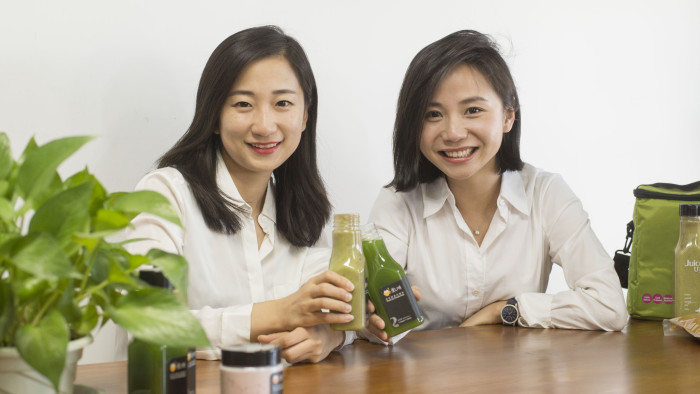JuiceUp gives fresh inspiration to China’s workers

Simply sign up to the Business education myFT Digest -- delivered directly to your inbox.
Investment banking has a reputation for being intense, arduous and stressful. But for three women financiers working in China, it was just these pressures that sparked the idea for their business venture designed to promote a healthier lifestyle.
The problem
It was while working for the China International Capital Corporation in Beijing, that Michelle Nie realised the job was so physically and mentally demanding that she had little time to exercise or eat a healthy diet. “My lifestyle was very unhealthy and I realised that my friends also had the same problem.”
The answer
While studying for her MBA at CUHK Business School in Hong Kong, Ms Nie had drunk detox juices. And while on her exchange programme at the University of California, Berkeley, she indulged in the fashion for cold-pressed juices. The detox concept was virtually unheard of in China until 2013, says Ms Nie. “That is when I thought that this might be a real opportunity.”
So Ms Nie and her two co-founders gave up their high-income jobs in finance in 2014 to launch JuiceUp, bringing nutritionally optimised cold-pressed fruit, nuts and vegetable juices to the Chinese market.
The people
Ms Nie met co-founder Tiffany Ren during the first week of their MBA programme in 2010, where circumstances threw them together in a shared tent during an outdoor bonding exercise at the start of the course. Both had come from the finance industry and on graduation both returned to it — Ms Nie in Beijing and Ms Ren in Hong Kong.
While working at CICC, Ms Nie met Maggie Wang, JuiceUp’s third founding member. The trio make a perfect team, according to Ms Nie, who describes herself as the ideas person in the company.
Ms Wang is strong on implementation and negotiations, she says, while Ms Ren had worked in the venture capital industry, so was instrumental in securing investors. As well as the three founders, JuiceUp has two further shareholders: Kevin Wen, co-founder of US-listed company LightInTheBox; and Boquan He, a professional investor.
The company now has more than 20 employees, with a further 20 working in juice production.
The product
Formulated by an Australian nutritionist, the juices have been sold in daily sets of six bottles with each bottle containing differing amounts of nutrients and sugar. The six bottles are designed to be drunk in a sequence. The concoctions are produced in Beijing with locally grown vegetables and imported fruits and nuts and are then shipped by air to more than 40 cities in China.
With names such as Bondi Beach (pineapple and pomelo) and Alice in Wonderland (cashews and almonds), the juices conjure up a lifestyle distant from Beijing’s environment. As such, the juices have been seen as luxury products. The market has proven price sensitive, with many customers ordering juices for just a couple of days — giving JuiceUp its first market challenge.
In response, JuiceUp has developed a weight-loss plan called aiuwei — Whoa! in English. Slimmers consume 1,200 calorie-a-day meal replacement juices for two consecutive days each week for several months.
The weather also plays its part. In winter up to 100 sets of juices a day are sold, but in summer that can double. The customer base is also different to what the co-founders expected.
“When we started, we thought 99 per cent [of consumers] would be female,” says Ms Nie. “For our new product [aiuwei], around 30 per cent are male customers.”
Letter in response to this report:
Gender should never be relevant in business / From Jen Smith
Comments